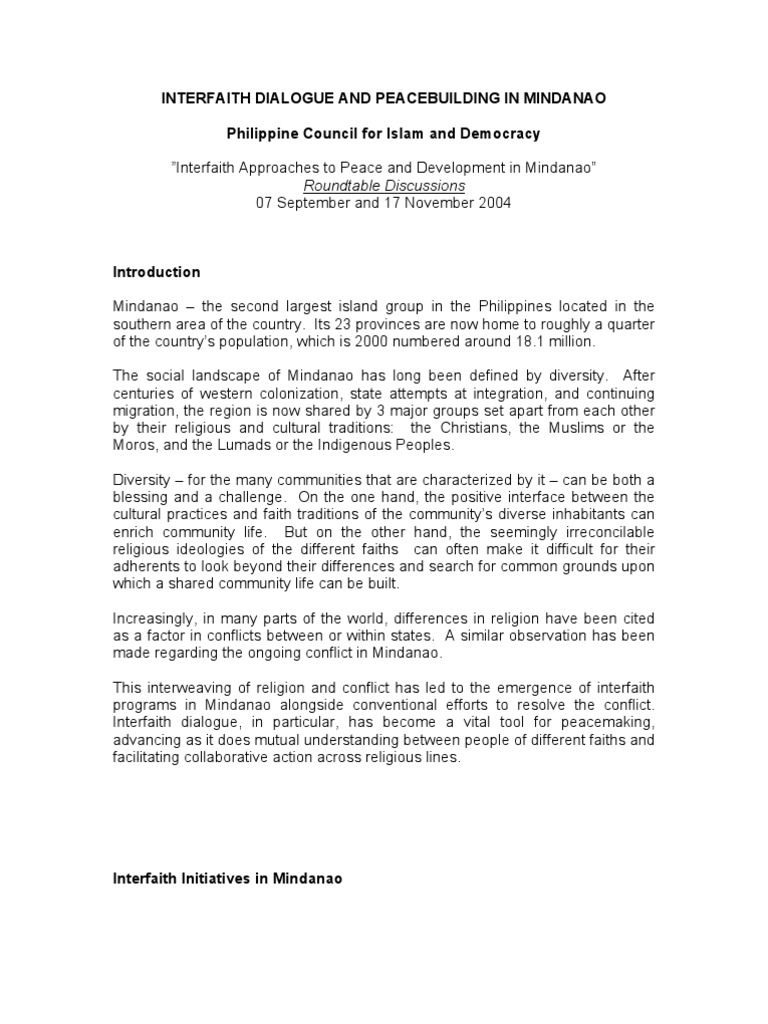Inter-religious dialogue is a vital conduit through which the diverse faiths of humanity converge, each seeking understanding, respect, and ultimately, peace. This dialogue transcends mere conversation; it is a profound engagement that addresses the intricacies of belief systems and fosters a spirit of unity amidst diversity. From a Christian perspective, this endeavor stands as both a challenge and an opportunity, crafted by the teachings of Christ yet complicated by historical interfaith tensions.
The roots of inter-religious dialogue can be traced back to scriptural exhortations that encourage followers to love their neighbors as themselves. In the Gospel of Matthew, the directive to engage with others is encapsulated in the parable of the Good Samaritan, where a figure from a disdained community demonstrates compassion that transcends cultural boundaries. This scriptural underpinning serves as a foundational principle for Christians envisioning dialogue not as a concession of faith but as an authentic expression of it.
Yet, what exactly is inter-religious dialogue? At its essence, it is a structured, respectful engagement between individuals of various faiths, aimed at fostering understanding and dismantling misconceptions. It goes beyond superficial exchanges, delving into deep-rooted theological beliefs, shared values, and differences that often lead to conflict. This dynamic can manifest through formal dialogues, community engagements, or informal discussions, all striving toward the common goal of peace. The intent is not to dilute one’s faith but to recognize the richness of perspectives that collectively contribute to the human experience.
There exists a compelling observation that leads to a deeper contemplation of inter-religious dialogue: humanity’s perennial quest for meaning. In an age characterized by rapid globalization and cultural exchanges, individuals increasingly find themselves encountering diverse belief systems. This phenomenon can evoke feelings of both fascination and trepidation. The initial draw is often a search for commonality—a recognition that beneath varying doctrines lies a shared desire for truth, goodness, and connection. However, this exploration can also uncover bleak misunderstandings, fear, and intolerance, highlighting the urgent need for meaningful dialogue.
Within a Christian context, engaging in inter-religious dialogue serves several transformative functions. Firstly, it acts as a learning opportunity. When Christians engage with other faith traditions, they are invited to examine their own beliefs more critically. For example, understanding the tenets and practices of Islam can elucidate the shared Abrahamic roots, fostering a deeper appreciation of one’s own faith. This introspection catalyzes spiritual growth, steering believers towards a more profound embodiment of their convictions.
Moreover, inter-religious dialogue provides a platform for conflict resolution. Historical grievances and theological disputes have often marred relations between different faith communities, leading to violence and division. Engaging in dialogue allows representatives of these faiths to acknowledge past injustices and express a communal desire for reconciliation. This acknowledgment forms the bedrock for collaborative efforts in addressing contemporary societal challenges such as poverty, environmental degradation, and social injustice, thus furthering the peace process.
Additionally, inter-religious dialogue cultivates a culture of respect. Within the Christian framework, the concept of respect is linked with the inherent dignity bestowed upon every human being, created in the image of God. Acknowledging the beliefs of others does not equate to compromise; rather, it fosters an environment where diverse perspectives can coexist, enriching the communal tapestry of society. Through respectful dialogue, Christians can model the love of Christ, effectively demonstrating that different paths can lead to the same truth celebrated in mutual admiration rather than strife.
While the benefits of such dialogue are significant, challenges abound. There is a natural apprehension surrounding the potential for doctrinal dilution or the fear of syncretism. Christians must navigate the delicate balance between maintaining the integrity of their faith and engaging openly with others. However, the key lies in recognizing that encountering different beliefs can enhance one’s own understanding rather than diminish it. An exploration of others’ perspectives can reveal the complexities of one’s own beliefs, inviting an embodied faith that is both robust and resilient.
Furthermore, the role of community cannot be understated in the practice of inter-religious dialogue. Religious leaders and laity alike must collaboratively engage in these discussions, creating a bridge between the sacred teachings and everyday practices. Churches can facilitate interfaith gatherings, promoting community service initiatives that bring together individuals from diverse backgrounds to work toward common goals. These grassroots efforts reinforce the notion of collective humanity and the shared responsibility for one another’s well-being.
In conclusion, inter-religious dialogue serves as a cornerstone for peacebuilding within a Christian framework. It is an invitation to explore the richness of faith traditions while nurturing an environment of respect, understanding, and love. In an increasingly fragmented world, the pursuit of peace through dialogue is not merely an option but a necessity, rooted in the very essence of Christian teaching. As believers engage authentically with their neighbors, they embody the kingdom of God, manifesting a reality where diverse faiths coexist harmoniously. Ultimately, through dialogue, we bridge the chasms that often divide us, paving the way for a more peaceful and understanding world.



